LSU women's basketball coach Kim Mulkey subjected to harsh lens that no male coach is
ALBANY, N.Y. — You want to know why Kim Mulkey treats anyone not on her team or in her small circle with contempt or suspicion? Why she’s not willing to entertain the opinions of those who made their minds up about her long ago? Consider a six-hour span Saturday.
A few hours before LSU was to play UCLA, a spot in the Elite Eight on the line, the Washington Post finally published its much-hyped story on Mulkey. A profile that was both heavy on well-established narratives and delved into her decades-long estrangement from her father in a way that was both uncomfortable and inappropriate.
Then, after the game, Mulkey decried a Los Angeles Times column that was, somehow, even worse. It described her team as “dirty debutantes” — yes, the term refers to exactly what you think it does — and is not a dog whistle of misogyny and racism but a blaring bullhorn.
“How dare people attack kids like that?” Mulkey asked, her rage evident. “You don't have to like the way we play. You don't have to like the way we trash talk. You don't have to like any of that. We're good with that.
“But I can't sit up here as a mother and a grandmother and a leader of young people and allow somebody to say that.”
FOLLOW THE MADNESS: NCAA basketball bracket, scores, schedules, teams and more.
Mulkey has long been college basketball’s most colorful and controversial figure and has, for almost as long, prompted a level of vitriol among the media that borders on the unprofessional.
Some of it she brings on herself. She says, does and wears things that shock and offend. She frames things to suit her purposes, including her claim following Saturday’s game that she didn’t know the Post story had been published despite being asked about it before the game.
Even when it would help her — clarifying her relationship with Brittney Griner, for example — she refuses to explain or edit herself.
But none of that justifies the delight and commitment there seems to be in trying to take Mulkey, and now her current players, down a peg.
“Since the national championship, we ain't had peace. And it's crazy to say that. That we won at the highest level in college and we haven't had peace,” Angel Reese said. “But I wouldn't want to change this day. I wouldn't want to change where we are right now.”
Reese can say that, having all the optimism and naivete of a 21-year-old.
But the rest of us need to start demanding better.
“I'm in the last third of my career, but I'm not going to let sexism continue. And if you don't think that's sexism, then you're in denial,” Mulkey said.
She was referring to the Times column, but she could just as well have been referring to the notions that have long surrounded her.
Women are held to different standards, and that goes double for women who are successful. Quadruple for women who are successful in businesses traditionally dominated by men. A woman whose worth and value is not tied to a man is seen as a threat, and the response is almost always to belittle her accomplishments and scorn her actions.
Remember when Taylor Swift was ruining the NFL?
There are plenty of male coaches with documented records of doing terrible things or being unlikable people who have not been put under the microscope like Mulkey has.
Ole Miss coach Chris Beard was fired at Texas after being arrested for domestic violence. According to the arrest affidavit, Beard’s fiancée said he “choked me, threw me off the bed bit me, bruises all over my leg, throwing me around, and going nuts.” Where was the deep dive into his relationships, professional and personal?
D.J. Durkin, now the defensive coordinator at Auburn, was fired as the head coach at Maryland after one of his players died, of heatstroke. Did the old-school, hyper-macho atmosphere Durkin fostered contribute to the young man’s death? I must have missed that in the 7,000-word examination of Durkin's psyche.
Rick Pitino acknowledged having sex with a woman who was not his wife and paying for her to have an abortion. It wasn’t even mentioned in a profile about his most recent act of redemption.

Plenty of other coaches appear to be having rage strokes on the sidelines. Have blistered their players publicly. For them, it’s dismissed as “passion” or praised as “tough coaching.” Nothing to see here or look at further.
Yet it’s somehow fair game to detail the coach’s decades-long estrangement from her father, presenting as a sympathetic figure a man who devastated his daughter by cheating on her mother and walking out on his family, suggesting instead that it’s Mulkey who is the heartless one.
There are debates to be had about the ethics of digging that far into Mulkey’s background, even if she did write about her father in her book. Even the best of families are complicated and messy. Treading into the fractures in one that isn’t is dangerous territory that reeks of tabloid voyeurism.
The character flaws of Mulkey’s father are his and his alone. The suggestion her reaction to them is evidence of one of hers is both inappropriate and unseemly, armchair psychology at best given Mulkey didn’t talk to the Post.
An obligation she did not owe, mind you, and was probably even less inclined to do when she learned the Post was inquiring about questions and people who’ve had nothing to do with her success.
"Reporters who give a megaphone to a one-sided, embellished version of things aren't trying to tell the truth. They're trying to sell newspapers and feed the click machine," Mulkey said last weekend, when she threatened to sue the Washington Post. "This is exactly why people don't trust journalists and the media anymore. It's these kinds of sleazy tactics and hatchet jobs that people are just tired of."
Mulkey was roundly criticized for that statement, for making a story when there wasn't one yet. But having now seen it, along with the distasteful column about her team, it's hard to argue with her.

Without evidence of any wrongdoing, a disagreeable personality has been deemed an unforgivable sin. It’s now a given she’s homophobic. A COVID denier. A MAGA devotee. Her players a discredit to the game.
None of us know if any of that is true, though. But minds were made up long ago about Mulkey, facts and fairness be damned.
You might not like Mulkey. You might not like her players. But if you are not bothered by the public discourse that surrounds them and cannot see the sexism and racism at its root, the problem isn’t them.
It’s you.
Follow USA TODAY Sports columnist Nancy Armour on social media @nrarmour.
Disclaimer: The copyright of this article belongs to the original author. Reposting this article is solely for the purpose of information dissemination and does not constitute any investment advice. If there is any infringement, please contact us immediately. We will make corrections or deletions as necessary. Thank you.





